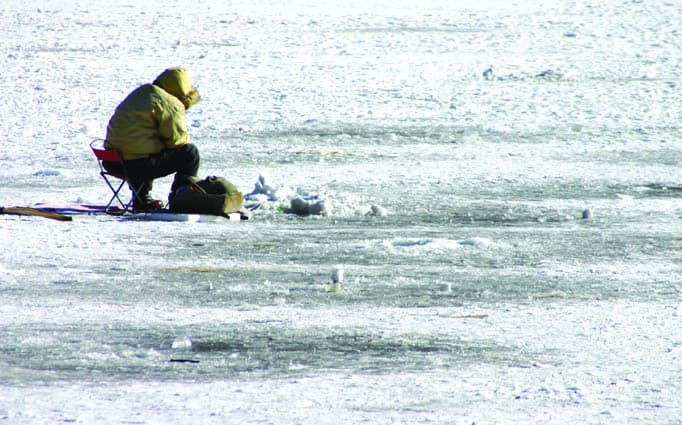The recent arrival of cold temperature has formed early-season ice on Vermont ponds, lakes and rivers. The Vermont Fish & Wildlife Department reminds winter enthusiasts that ice should never be considered safe and ice conditions vary.
“We are urging all outdoor enthusiasts—people going ice fishing, cross-country skiers, hikers, and snowmobilers—to be extremely cautious and prepared if they are going to venture out on any ice,” said Vermont Fish & Wildlife Commissioner Louis Porter. “Ice conditions can vary dramatically on different parts of a lake. Remember, even though it may look thick enough on the surface, moving water from currents, rivers and springs can cause ice to form unevenly.”
“Once we have sustained cold weather to form good ice, activities such as ice fishing can be safe and a lot of fun,” said Porter, “but when we go onto the ice, we need to use good judgment and observe several safety precautions.”
Leave your car or truck on shore. Every year several motor vehicles go through the ice on Vermont lakes, and some people have drowned as a result.
Leave information about your plans with someone—where you intend to fish and when you expect to return.
Wear a personal flotation device and don’t fish alone.
Fish with a friend. Ice fishing is a great sport to share with family members and friends, and having a partner with you increases both the fun and the safety.
Ice varies in thickness and condition. Always carry an ice spud or chisel to check ice as you proceed.
Be extremely cautious crossing ice near river mouths, points of land, bridges, islands, and over reefs and springs. Current almost always causes ice to be thinner over these areas.
Avoid going onto the ice if it has melted away from the shore. This indicates melting is underway, and ice can shift position as wind direction changes.
Waves from open water can quickly break up large areas of ice. If you can see open water in the lake and the wind picks up, get off!
Bring your fully-charged cell phone with you.
Carry a set of hand spikes to help you work your way out onto the surface of the ice if you go through. Holding one in each hand, you can alternately punch them into the ice and pull yourself up and out. You can make these at home, using large nails, or you can purchase them at stores that sell fishing supplies.
Carry a safety line that can be thrown to someone who has gone through the ice.
Heated fishing shanties must have good ventilation to prevent deadly carbon monoxide poisoning. Open a window or the door part way to allow in fresh air.
VTF&W offers ice safety tips




